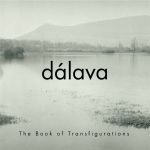
Dálava - The Book of Transfigurations [Songline Recordings - 2017]" /> |
Dálava is an ensemble that works to ressurect an ancient style of 'Moravian' (Czech) folk song, augmenting traditional melodies with modern instrumentation. The group created one other album, self titled, in 2014, prior to this album "The Book of Transfigurations", which has been released on contemporary jazz label Songlines.
I had never before heard of 'Moravian' culture. Though the music is Eastern European, I wouldn't have guessed by the sound of it, and in fact it strikes me as Latin or Spanish in tone at times, with the general unabashed intensity and emotion of the vocal delivery, and the emphatic guitar playing, which at times sounds similar to the flamenco style. As such, this album is truly informative and enlightening. I'm not sure exactly how old these songs are, but they have a lasting emotional power. They reveal their age only in the sense that the melodies sound as if they could retain their distinct character whether acapella, or with any variety of orchestrations, a common characteristic of standards that have appeared in countless versions.
With tremendously wide dynamic range, Dálava's musical style dances between more the traditional folk sounds of acoustic guitar and strings to raucous, punishing avant rock. Lively, punctuated strumming with stabbing, overdriven guitar tones and punk-ish vocal distortion define the louder sections. Angular palm-muted stop-start riffing solidifies the sound's modernity. The band does not pull back from intensity and volume, with even the drums sounding blown out and distorted on occasion.
Julia Ulehla's confident, impassioned vocals take center stage throughout. She is unafraid to sing with formidable vigor and volume, seeming never to deplete herself of air or energy. There is a warm, soulful, lived in quality to her vibrato which is more folk than classical, although she is quite technically skilled, with great pitch. Surprisingly, she is just as natural when spitting out venomous punkish yells. She simply peels paint off walls. It is ultimately her who has brought these songs to life, as she would surely be compelling enough with no accompaniment at all.
Archival folk recordings are woven into the album's first and last tracks, apparently sung by someone who is not in the band named Jiøí Úlehla (a relation of Julia's?). These are the only male vocals on the album, providing such a wondrous compliment to Julia that I find myself wishing there were a male vocalist present on the rest of the album in addition to her. One can hear the strong influence these recordings must have had on the sound of Dálava, as the emotional intensity and vibrato in this man's singing is very similar, as are the dramatic crescendos and rhythmic patterns in the accompaniment.
This album has an intense, direct emotionality and strong melodicism that is missing from rock music these days. Dálava has gifted a new voice to something ancient and immediately effecting by reinterpreting these songs. Though only a small subset of people will understand the lyrics, you may find yourself in tears without knowing how exactly to describe the emotion you have been brought to. Suffice to say this album has feeling and power, and can be played countless times without fatigue, as these are songs that had stood the test of time long before the album was even recorded.       Josh Landry Josh Landry
|

